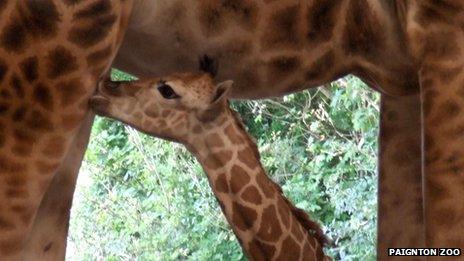Rothschild's giraffe calf death shocks Paignton Zoo
- Published

The zoo said although the calf had appeared to be doing well, he might not have been getting enough milk from his mother
A rare Rothschild's giraffe calf has died at Paignton Zoo in Devon.
The zoo said it was shocked and saddened by the unexpected death of the eight-day-old male calf, which was found earlier by keepers.
Rothschild's giraffes are one of the most endangered subspecies, with only a few hundred left in the wild.
A post-mortem examination will be carried out to find out the cause of the 6ft (1.8m) calf's death, the zoo said.
'Ups and downs'
"This was a shock to all of us," senior keeper Matthew Webb said.
"Keepers were watching the calf closely each day and he had been doing very well, he was strong and active, coming out with the rest of the herd and resting in the paddock in the sun.
"His mother was attentive, but it's possible that either she did not have enough milk, or was simply not allowing him to feed properly.
"Giraffe babies can go downhill very quickly. With most newborns, if they get ill or haven't fed properly, they will fade very rapidly.
"We did not step in, as he was obviously getting milk - hand rearing is very much a last resort."
It is fourth instance in recent years of a Rothschild's giraffe dying at the zoo.
Last year, vets had to put down a calf called Kitto after he was rejected by his mother and developed breathing problems. In 2006, a fire killed a mother and her week-old calf.
Neil Bemment, the zoo's curator of mammals, said although the death was "very sad", it was part of the normal struggle of working with endangered species.
"You have to carry on," he said.
"A post-mortem examination will be carried out. One possibility is that he had not had enough milk from mum, but he could have caught an infection, so we can't be sure at this stage."
As part of the European Endangered Species Programme, the zoo has a remaining herd of three adult Rothschild's and two juveniles.
Rothschild's giraffes are native to Kenya, Uganda and Sudan.
Poaching and habitat loss have contributed to the animals' decline.
According to the Rothschild's Giraffe Project, external, there are now fewer than 700 of the animals remaining in the wild.
- Published29 March 2013
- Published15 February 2012